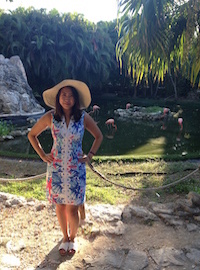My life goal is enable positive change wherever I go by applying a philosophy of continuous improvement in every opportunity that comes my way. Whether it is in my personal life, school, extracurricular activities, or the workplace, I strive to develop new skills and push the limits of my existing capabilities. It is important to me that I always take a critical view of the status quo and never stop learning. Beyond this, continuous improvement to me also means helping other people do the same. In my spare time, I enjoy practicing hot yoga, painting, and experimenting with new recipes.
Additional Information
What is your personal definition of sustainability?
To me, sustainability is a conscious effort to take into consideration the environmental, economic, and social impact of one’s decisions before taking action. It is a holistic perspective of the world that includes not only the sum of its parts, but the interconnections between the the environment, economy, and society. It is the understanding that what you do today will have implications on what future generations will be able to do. It means applying this understanding by engaging in behaviours that will allow individuals to meet their present needs without compromising the needs of future generations.
What role do you see sustainability playing in your professional career?
With a philosophy of continuous improvement, a focus on sustainability can help me enable positive changes in both an organization and entire communities around me. Whether I am an entry level analyst or senior level manager, a sustainability perspective can help generate new insights because I am taking into account the implications of my decisions on multiple stakeholders and the environmental, economic, and social impact of my actions. Business analysis through a sustainability lens can generate new ideas and ways of doing things because there are additional criteria for decision-making. Sustainable decision-making will inevitably influence how a business is run, who the business is accountable to, and how the success of a business is defined. The potential result of integrating sustainability into traditional business practices is an organization that exists not only as an economic entity, to generate money, but to serve another purpose. The benefits of sustainability are not limited to advancing social or environmental causes. Given the rapidly changing environment and increasing consumer concerns for social and environmental issues, sustainable management can help a firm be more flexible and respond to change. Essentially, sustainability will make me a more critical thinker, forcing me to think beyond what is currently possible.
What sustainability projects have you been engaged in?
I have been involved in a variety of sustainability activities including volunteering for a senior’s home, collecting food for the London Food Drive, increasing awareness of mental illness and cancer, and picking up recyclables after Western’s homecoming. The two most recent projects I was involved in were the United Way Workplace Campaign and the Junior Achievement Company Program.
As part of the United Way Campaign Committee at Celestica Inc., I collaborated with diverse individuals to organize, and execute various events, raising $420,000, which was used to build underprivileged communities. I also spearheaded my department’s fundraising event, convincing the Vice President of Global Operations to dye his hair pink and shave his head in exchange for donations.
As the marketing and sales advisor for The Junior Achievement Company Program (JACO), I volunteered to mentor 35 high school students in the startup, operation, and liquidation of a student-run business over an 18-week program. I ran sessions to teach marketing and sales strategies and provided guidance on how to manage teams, delegate tasks, and address team conflicts. The virtually free program developed the students’ business skills and confidence to succeed in the workplace.
This summer, I plan to pursue additional social impact initiatives.
